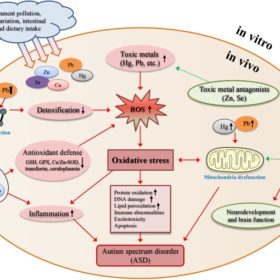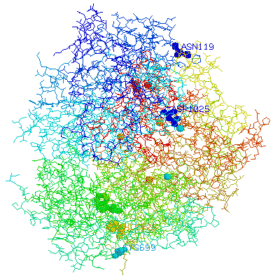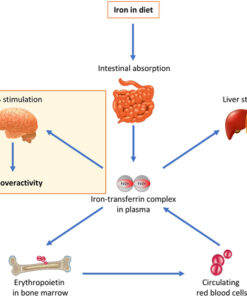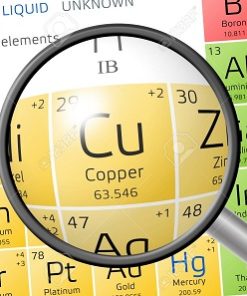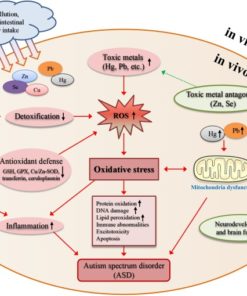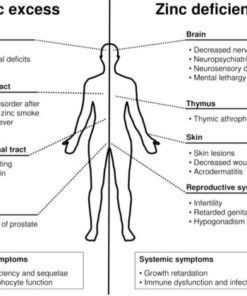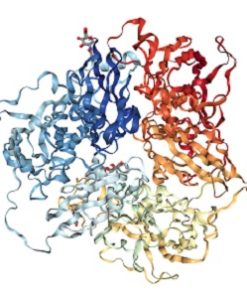
Obesity, Estrogen, and Copper: A Complex Relationship with Health Implications
Obesity is a medical condition characterized by excessive accumulation of body fat that can impair health. It is typically identified by a BMI of 30 or higher, but other measures like waist circumference or body fat percentage can also be used. This condition is associated with serious health problems such as diabetes, cardiovascular disease, hypertension, and certain types of cancer, making it a major public health concern worldwide.
Recent research has highlighted the potential role of estrogen and copper in the development of these health problems, particularly in the context of obesity. Alterations in estrogen and copper activity can lead to copper overload, oxidative stress, and anxiety, which are known to contribute to the development of various health problems. These health problems include the aforementioned conditions associated with obesity, underscoring the significance of the interplay between obesity, estrogen, and copper in the context of public health.
Estrogen and Copper
Estrogen and copper have a multifaceted relationship in the body that has significant implications for health. Estrogen can affect copper homeostasis through a variety of mechanisms, such as regulating copper transport proteins and increasing vascular permeability. Changes in estrogen levels, like during menopause or with hormonal contraceptives, can disrupt the body's ability to regulate copper levels, leading to copper overload and oxidative damage. This, in turn, can contribute to the development of several health problems, including anxiety.
As a result of estrogen-induced angiogenesis, copper ions can leak out of the bloodstream and accumulate in tissues, causing oxidative damage and contributing to the development of chronic diseases like diabetes, heart disease, and neurodegenerative diseases. Moreover, estrogen can upregulate the expression of copper transport proteins in the liver, leading to increased copper uptake and tissue accumulation.
Considering the complex relationship between estrogen and copper is crucial when studying the impact of obesity on health. Understanding this interplay can provide insights into the development of various health problems associated with obesity, including anxiety.
Copper overload can also contribute to the development of various health problems, including anxiety, depression, and other psychiatric disorders. The regulation of neurotransmitters such as dopamine and noradrenaline, which are involved in the regulation of mood, motivation, and stress response, is one of the most important mechanisms by which copper affects mental health. Copper is a cofactor for the enzyme dopamine-beta-hydroxylase (DBH), which is involved in the conversion of dopamine to noradrenaline. Elevated levels of copper in the brain can lead to the depletion of dopamine levels and the overproduction of noradrenaline, leading to anxiety and other related symptoms.
In addition to its effects on neurotransmitter activity, copper overload can contribute to the development of oxidative stress, inflammation, and damage to cells and tissues, which can further exacerbate the negative effects of obesity on health. Excess copper can catalyze the production of reactive oxygen species (ROS), leading to oxidative stress and damage to cellular components such as DNA, proteins, and lipids. Moreover, copper can activate inflammatory pathways and contribute to the production of pro-inflammatory cytokines such as interleukin-1β (IL-1β) and tumor necrosis factor-alpha (TNF-α), which can exacerbate inflammation and contribute to the development of various inflammatory diseases.
Obesity can also alter the activity of copper-dependent enzymes and proteins, leading to disruptions in various physiological processes. For example, obesity has been linked to impaired copper-dependent energy metabolism, which can contribute to the development of metabolic disorders such as type 2 diabetes. Additionally, obesity can affect the activity of copper-dependent enzymes involved in neurotransmitter synthesis, which can lead to imbalances in dopamine and norepinephrine signaling and contribute to anxiety and other mood disorders.
Furthermore, obesity-related changes in gut microbiota composition and function can also influence copper homeostasis and contribute to copper overload. The gut microbiota plays a crucial role in copper absorption and metabolism, and dysbiosis in the gut can disrupt copper homeostasis and contribute to its accumulation in tissues. Additionally, obesity-related changes in gut microbiota composition and function can lead to the production of inflammatory metabolites, which can contribute to oxidative stress and inflammation and exacerbate the pathological effects of copper overload.
Elevated Copper Levels and Neurotransmitter Imbalance in Obesity
Studies have found that obese women have elevated levels of both total and free copper in their blood. Elevated levels of free copper, which is not bound to proteins, can contribute to copper toxicity and oxidative stress in tissues. Moreover, free copper can interfere with the balance of neurotransmitters in the brain, leading to alterations in mood and behavior. Copper can lower dopamine levels, which is associated with feelings of reward and pleasure, and increase noradrenaline levels, which is associated with stress and anxiety and depression. This can contribute to emotional dysregulation and other psychological symptoms commonly reported by obese individuals, such as depression, anxiety, and binge eating. Copper overload has also been linked to cognitive impairments, including decreased attention and memory function. Therefore, the elevated levels of copper in obese individuals may contribute to the development of both physical and psychological symptoms associated with obesity. More on the topic of copper, dopamine and norepinephrine can be found in the links at the bottom of this page.
The Connection Between Elevated Copper and Estrogen: Five Other Health Concerns for Women with Obesity
Elevated levels of copper and estrogen can have significant implications for women with obesity, as they contribute to various health concerns beyond neurotransmitter activity and oxidative stress. The interplay between these two elements can lead to significant health consequences, including:
- Cardiovascular disease: Elevated copper levels have been linked to an increased risk of cardiovascular disease, including hypertension and atherosclerosis. Estrogen, on the other hand, has been shown to have pro-inflammatory effects on the vascular endothelium, which can contribute to the development of endothelial dysfunction and arterial stiffness, both of which are risk factors for cardiovascular disease.
- Cancer: Both copper and estrogen have been implicated in the development and progression of various cancers. Elevated copper levels can promote tumor growth and angiogenesis, while estrogen has been linked to the development of estrogen-sensitive cancers such as breast and ovarian cancer.
- Neurological disorders: Copper and estrogen both play a crucial role in the development and function of the nervous system. Elevated copper levels have been linked to neurological disorders such as Alzheimer's and Parkinson's disease, while estrogen has been shown to have neuroprotective effects.
- Reproductive health: Estrogen is a critical hormone involved in the regulation of reproductive function, while copper is essential for the development and function of the female reproductive system. Elevated levels of copper and estrogen can lead to disruptions in menstrual cycles, infertility, and other reproductive health concerns.
- Metabolic disorders: Copper is involved in various metabolic processes, including energy metabolism and glucose homeostasis. Elevated copper levels can lead to disruptions in these processes, contributing to metabolic disorders such as insulin resistance, diabetes, and obesity. Estrogen has also been linked to metabolic disorders, including the development of insulin resistance and obesity.
Reducing copper levels may help alleviate health problems associated with obesity and estrogen dominance
In summary, obesity, estrogen dominance, and elevated copper levels can have far-reaching effects on health beyond their impacts on neurotransmitter activity and oxidative stress. The connection between copper and estrogen can contribute to the development of a range of health issues, including cardiovascular diseases, metabolic disorders, cancer, neurological disorders, and reproductive dysfunction.
To alleviate the symptoms of obesity, addressing copper overload is essential. Although copper is an important mineral, an overabundance of it can cause inflammation, oxidative stress, and disruptions in physiological processes. To reduce copper overload, individuals can alter their diet to decrease their intake of copper-rich foods, avoid well water with high levels of copper, reduce estrogen exposure from hormones including birth control pills, IUD's, and with the help of a Walsh-trained physician, cautiously begin a regimen of zinc supplementation plus antioxidants to help balance copper levels in the body. Weight reduction will also lower copper, though it too must be done carefully, with simultaneous zinc and antioxidant support. Rapid loss in weight will lead to an upsurge in blood levels of copper and could exacerbate emotional and physical symptoms.
Additionally, managing estrogen levels through lifestyle modifications like maintaining a healthy weight, avoiding environmental estrogens, and reducing stress can mitigate the risk of estrogen dominance and related health concerns. It is crucial to note that reducing copper and managing estrogen levels should be done under the supervision of a healthcare professional, as both are necessary for proper physiological function.
In conclusion, understanding the intricate connection between copper and estrogen can have significant implications for preventing and managing various health problems associated with obesity and other metabolic disorders. By comprehending the relationship between these vital minerals and hormones, individuals can proactively take measures to enhance their health and wellbeing.
Understanding Copper Overload
Testing for Copper Overload
Other Single Item Tests
All Cognoscopy Labs
All Cognoscopy Labs
All Cognoscopy Labs
Walsh Approach Test Panels



